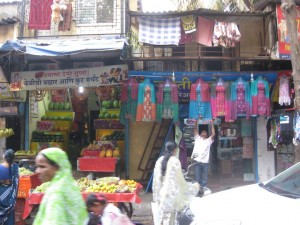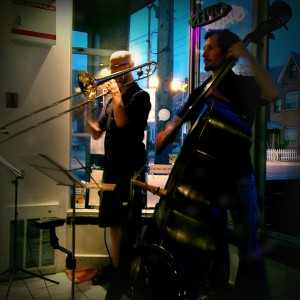Though there are smaller examples from earlier times in history, it is the British East India Company that is usually thought of as the first great “joint-stock company,” and it is shortly after its founding around 1600 that the “stock market” began in Amsterdam.
The basic idea of the joint-stock company is simple: a number of different people put up the money to launch an enterprise–they “buy stock” in it–and that company then does business, either paying back the investors out of its profits, or paying them dividends on their stocks. Of course, if the company fails, the stockholders get nothing back.
The basic idea of the stock market is also simple: you can sell your stock in a company to someone else, so that they can take the risk and receive the dividends. Your stock in a company that seems successful may well sell for a higher price than you initially paid, or for a lower price if the company appears to be failing.
The British East India Company, that first great joint-stock venture, set up shop in India with the sanction of the British government and with the compliance of various local rulers in what is now northeast India.  The wealth that was returned to the stockholders (and to those carrying out the enterprise in India) came from the goods produced by Indian labour that the Company was able to sell in Britain for a much higher price than they paid in India.
The wealth that was returned to the stockholders (and to those carrying out the enterprise in India) came from the goods produced by Indian labour that the Company was able to sell in Britain for a much higher price than they paid in India.
Those buying and selling stock in the Company back in Europe did not really need to know much about India, (though, to be sure, their insight into whether or not the Company was likely to succeed would surely vary with their level of insight into the workings of the Company). To make (or lose) money, all they had to do was exchange some money for a slip of paper identifying them as shareholders.
And, of course, the wealth they used to buy the shares was itself the product of people labouring. If someone traded grain for shares, that grain was the result of many man-hours of labouring to plant, cultivate, harvest, and transport the grain, and similarly for any other kind of wealth. A wealthy English landowner who owned large farms and received rent payments in grain from many tenant-farmers of course needed to know nothing of the ways of farming in order to be able to spend that wealth.
The wealthy buyers and sellers of stock thus have a very particular experience: they are exchanging the wealth produced by Indian labourers for the wealth produced by English labourers without ever necessarily coming into contact with either domain of wealth-production; their experience is limited to an exchange of one piece of paper identifying ownership of grain for one piece of paper identifying ownership of stock.
In fact, the decisions of such wealthy men of commerce to fund or not to fund an enterprise have substantial economic consequences. Indeed, had various such men not subscribed to the British East India Company, the sea trade with India would not have developed. (And, of course, neither would the various Indian repressions, famines, and wars caused by the policies and practices of the Company have happened, and various existing practices of trade for Asian goods would have continued and those practicing them would have continued to make a living.) In this sense it is surely true that the wise deployment of wealth is essential to the development of productive enterprise.
The experience of the businessman who buys stock that he can subsequently sell for a higher price is that, by his wise trading, he “made money,” to use the English idiom. This idiom, though, is clearly misleading. The trader now has legal control of greater wealth than he had before; in fact, though, he made nothing. The Indian and English workers made the wealth he now controls.
The role of the financiers or merchants “making money” while facilitating or hindering productive enterprise by exchanging goods or buying and selling stock is rather like the role of the DJ at a dance club or on the radio. The DJ selects the tunes and their tempo, volume, and sequence, and, if this is well done, the people dance. When this role is carried out well, music and audience meet each other in a way that lets each reach its appropriate fulfillment through connecting with the other.
The DJ, however, is not a musician. The DJ’s action depends entirely upon the thousands of people who have spent years labouring to learn to play their instruments and who bring to the world their creativity and effort in their making of music. The DJ’s success also depends entirely upon the participation of the crowds who attend and dance. Imagine a huge dance club with no pre-recorded music for the DJ to choose from, or with only 5 people in attendance! A group of dancers and a group of musicians can make a party without any DJ present. The other way doesn’t work.
The DJ’s success also depends entirely upon the participation of the crowds who attend and dance. Imagine a huge dance club with no pre-recorded music for the DJ to choose from, or with only 5 people in attendance! A group of dancers and a group of musicians can make a party without any DJ present. The other way doesn’t work.
There is a good reason for the existence of stock trading and good reason for the existence of DJs. In each case, strong results are produced by the organizing and directing of different but complementary resources to produce mutually beneficial exchanges that would not happen otherwise. Such organizing and directing is a task and a skill that is not simply reducible to the production of the resources exchanged, and it makes sense that those who have excellent abilities at carrying out this organizing for the betterment of all involved should be respected for their talents and rewarded for their efforts.
It would be a disaster for economic life and for musical life, however, to mistake merchants for producers or DJs for musicians. It is only through the labours of the workers and the musicians who are respectively the generative sources of our economic and musical life that there is any wealth for merchants and DJs to manipulate. If we confuse DJs with musicians or financiers with producers, and turn to them to provide for our economic and musical needs, we undermine the very sources of economic and musical life and win for ourselves an ever more sterile and non-productive world.
Unfortunately for all of us, this disaster has already occurred.


 Participants in these
seminars consistently have the experience of growth in their conversation and
conceptual abilities, and typically leave with a transformed sense of the nature
and possibilities of philosophy.
Participants in these
seminars consistently have the experience of growth in their conversation and
conceptual abilities, and typically leave with a transformed sense of the nature
and possibilities of philosophy.





One Comment
I was reading about a huge, eight billion dollar, buyout of the New York Stock Exchange (it’s parent company NYSE Euronext) by another finance firm today, and was reminded of this post.
I am thinking of your point that stock-systems of economic exchange entrench themselves by turning any mode of human production into a mode of money “production,” with the consequence that the intrinsic usefulness of any publicly traded venture becomes supplanted by its usefulness in generating money. With the sale of the New York Stock Exchange, I noticed how these money “making” markets are themselves made into stocks in a higher-level of exchange. Not only is this money “production” taken to be a real mode of production, but it is itself is turned into a commodity that is traded as a stock, a “derivative” whose value comes from some more “basic” mode of producing wealth. It scared me to think, then, that not only are real modes of human production being bought and sold, but this very process of exchange itself was part of this vicious circle, in which money “making” practices become entrenched as modes of production. I keep thinking about how this trading keeps developing these layers of money “making” without any limit, unlike the natural and cultural kinds of making, whose limits are becoming evident each day.
On a couple of different notes, this has made me think a lot about how we apportion and mathematically measure the real sources of production and value. Particularly, I have been thinking about how the human body is being turned into a “genome” of data sets that are capable of being owned as stock, patented, and which allow for significant influence over the ways we live. I have also been thinking more about how we measure land, and independent bits of property, and how we plan our production of infrastructure accordingly by constructing things like roads or pipelines over them, without considering the dependence of these lots on the surrounding environment. I don’t have much more to say about these things right now, except that I’m starting to notice how they are part of this deepening tragedy, which you so rightly note, that we’re all living.